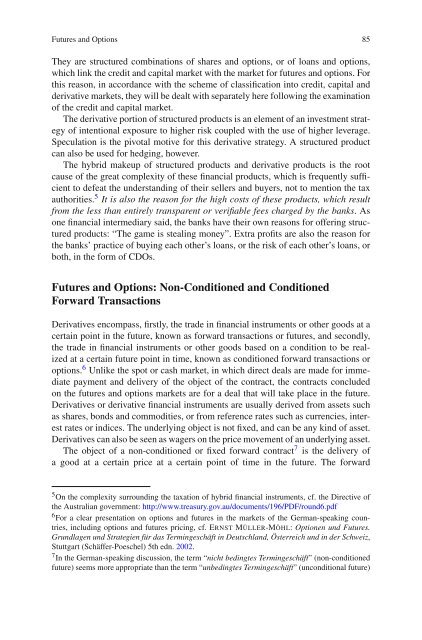The Ethics of Banking: Conclusions from the Financial Crisis (Issues ...
The Ethics of Banking: Conclusions from the Financial Crisis (Issues ...
The Ethics of Banking: Conclusions from the Financial Crisis (Issues ...
You also want an ePaper? Increase the reach of your titles
YUMPU automatically turns print PDFs into web optimized ePapers that Google loves.
Futures and Options 85<br />
<strong>The</strong>y are structured combinations <strong>of</strong> shares and options, or <strong>of</strong> loans and options,<br />
which link <strong>the</strong> credit and capital market with <strong>the</strong> market for futures and options. For<br />
this reason, in accordance with <strong>the</strong> scheme <strong>of</strong> classification into credit, capital and<br />
derivative markets, <strong>the</strong>y will be dealt with separately here following <strong>the</strong> examination<br />
<strong>of</strong> <strong>the</strong> credit and capital market.<br />
<strong>The</strong> derivative portion <strong>of</strong> structured products is an element <strong>of</strong> an investment strategy<br />
<strong>of</strong> intentional exposure to higher risk coupled with <strong>the</strong> use <strong>of</strong> higher leverage.<br />
Speculation is <strong>the</strong> pivotal motive for this derivative strategy. A structured product<br />
can also be used for hedging, however.<br />
<strong>The</strong> hybrid makeup <strong>of</strong> structured products and derivative products is <strong>the</strong> root<br />
cause <strong>of</strong> <strong>the</strong> great complexity <strong>of</strong> <strong>the</strong>se financial products, which is frequently sufficient<br />
to defeat <strong>the</strong> understanding <strong>of</strong> <strong>the</strong>ir sellers and buyers, not to mention <strong>the</strong> tax<br />
authorities. 5 It is also <strong>the</strong> reason for <strong>the</strong> high costs <strong>of</strong> <strong>the</strong>se products, which result<br />
<strong>from</strong> <strong>the</strong> less than entirely transparent or verifiable fees charged by <strong>the</strong> banks. As<br />
one financial intermediary said, <strong>the</strong> banks have <strong>the</strong>ir own reasons for <strong>of</strong>fering structured<br />
products: “<strong>The</strong> game is stealing money”. Extra pr<strong>of</strong>its are also <strong>the</strong> reason for<br />
<strong>the</strong> banks’ practice <strong>of</strong> buying each o<strong>the</strong>r’s loans, or <strong>the</strong> risk <strong>of</strong> each o<strong>the</strong>r’s loans, or<br />
both, in <strong>the</strong> form <strong>of</strong> CDOs.<br />
Futures and Options: Non-Conditioned and Conditioned<br />
Forward Transactions<br />
Derivatives encompass, firstly, <strong>the</strong> trade in financial instruments or o<strong>the</strong>r goods at a<br />
certain point in <strong>the</strong> future, known as forward transactions or futures, and secondly,<br />
<strong>the</strong> trade in financial instruments or o<strong>the</strong>r goods based on a condition to be realized<br />
at a certain future point in time, known as conditioned forward transactions or<br />
options. 6 Unlike <strong>the</strong> spot or cash market, in which direct deals are made for immediate<br />
payment and delivery <strong>of</strong> <strong>the</strong> object <strong>of</strong> <strong>the</strong> contract, <strong>the</strong> contracts concluded<br />
on <strong>the</strong> futures and options markets are for a deal that will take place in <strong>the</strong> future.<br />
Derivatives or derivative financial instruments are usually derived <strong>from</strong> assets such<br />
as shares, bonds and commodities, or <strong>from</strong> reference rates such as currencies, interest<br />
rates or indices. <strong>The</strong> underlying object is not fixed, and can be any kind <strong>of</strong> asset.<br />
Derivatives can also be seen as wagers on <strong>the</strong> price movement <strong>of</strong> an underlying asset.<br />
<strong>The</strong> object <strong>of</strong> a non-conditioned or fixed forward contract 7 is <strong>the</strong> delivery <strong>of</strong><br />
a good at a certain price at a certain point <strong>of</strong> time in <strong>the</strong> future. <strong>The</strong> forward<br />
5 On <strong>the</strong> complexity surrounding <strong>the</strong> taxation <strong>of</strong> hybrid financial instruments, cf. <strong>the</strong> Directive <strong>of</strong><br />
<strong>the</strong> Australian government: http://www.treasury.gov.au/documents/196/PDF/round6.pdf<br />
6 For a clear presentation on options and futures in <strong>the</strong> markets <strong>of</strong> <strong>the</strong> German-speaking countries,<br />
including options and futures pricing, cf. ERNST MÜLLER-MÖHL: Optionen und Futures.<br />
Grundlagen und Strategien für das Termingeschäft in Deutschland, Österreich und in der Schweiz,<br />
Stuttgart (Schäffer-Poeschel) 5th edn. 2002.<br />
7 In <strong>the</strong> German-speaking discussion, <strong>the</strong> term “nicht bedingtes Termingeschäft” (non-conditioned<br />
future) seems more appropriate than <strong>the</strong> term “unbedingtes Termingeschäft” (unconditional future)

















